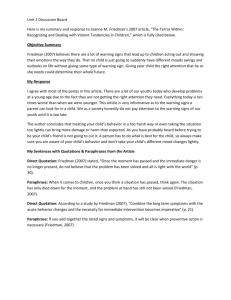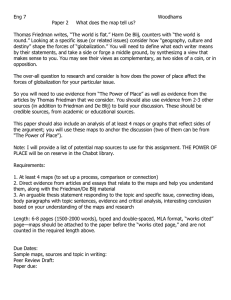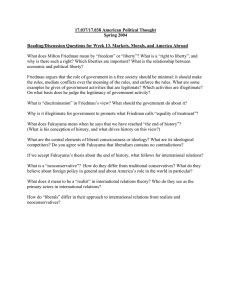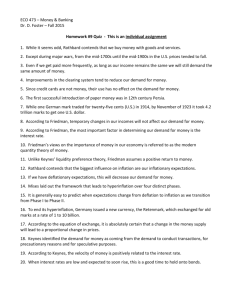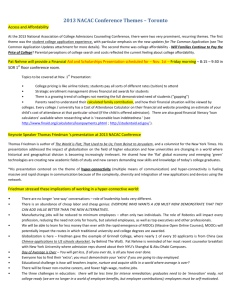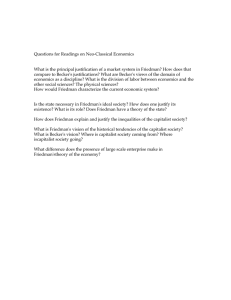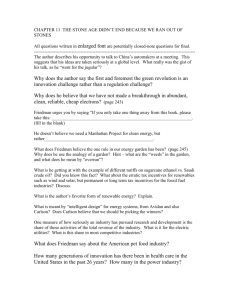Education Council (EC) Meeting Minutes
advertisement
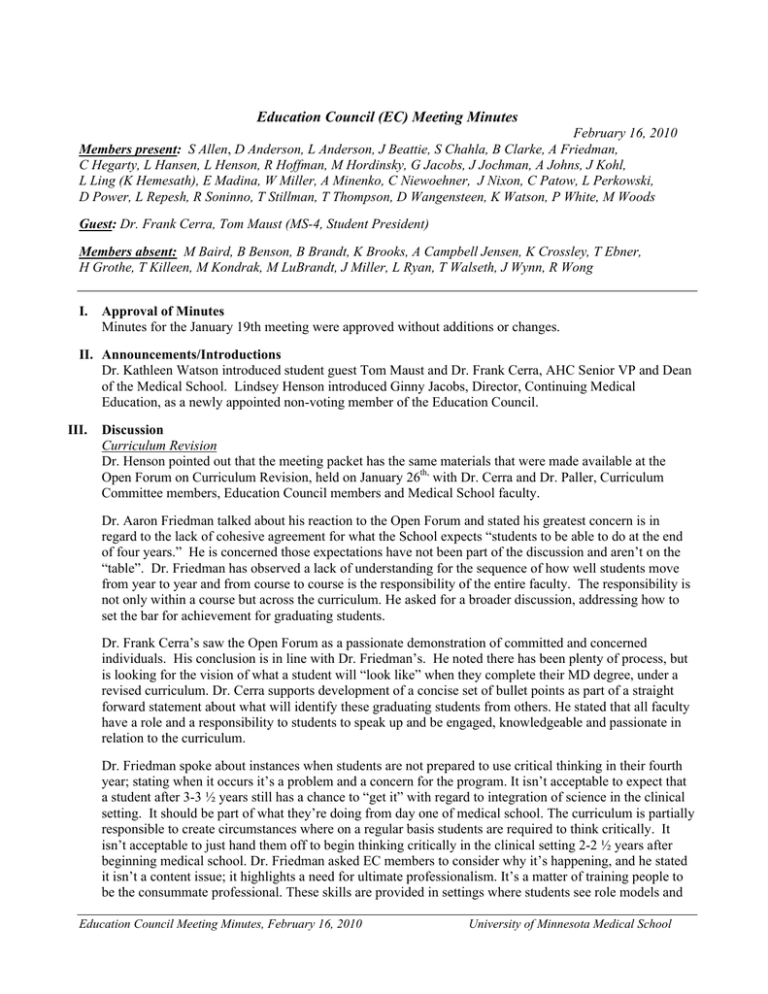
Education Council (EC) Meeting Minutes February 16, 2010 Members present: S Allen, D Anderson, L Anderson, J Beattie, S Chahla, B Clarke, A Friedman, C Hegarty, L Hansen, L Henson, R Hoffman, M Hordinsky, G Jacobs, J Jochman, A Johns, J Kohl, L Ling (K Hemesath), E Madina, W Miller, A Minenko, C Niewoehner, J Nixon, C Patow, L Perkowski, D Power, L Repesh, R Soninno, T Stillman, T Thompson, D Wangensteen, K Watson, P White, M Woods Guest: Dr. Frank Cerra, Tom Maust (MS-4, Student President) Members absent: M Baird, B Benson, B Brandt, K Brooks, A Campbell Jensen, K Crossley, T Ebner, H Grothe, T Killeen, M Kondrak, M LuBrandt, J Miller, L Ryan, T Walseth, J Wynn, R Wong I. Approval of Minutes Minutes for the January 19th meeting were approved without additions or changes. II. Announcements/Introductions Dr. Kathleen Watson introduced student guest Tom Maust and Dr. Frank Cerra, AHC Senior VP and Dean of the Medical School. Lindsey Henson introduced Ginny Jacobs, Director, Continuing Medical Education, as a newly appointed non-voting member of the Education Council. III. Discussion Curriculum Revision Dr. Henson pointed out that the meeting packet has the same materials that were made available at the Open Forum on Curriculum Revision, held on January 26th, with Dr. Cerra and Dr. Paller, Curriculum Committee members, Education Council members and Medical School faculty. Dr. Aaron Friedman talked about his reaction to the Open Forum and stated his greatest concern is in regard to the lack of cohesive agreement for what the School expects “students to be able to do at the end of four years.” He is concerned those expectations have not been part of the discussion and aren’t on the “table”. Dr. Friedman has observed a lack of understanding for the sequence of how well students move from year to year and from course to course is the responsibility of the entire faculty. The responsibility is not only within a course but across the curriculum. He asked for a broader discussion, addressing how to set the bar for achievement for graduating students. Dr. Frank Cerra’s saw the Open Forum as a passionate demonstration of committed and concerned individuals. His conclusion is in line with Dr. Friedman’s. He noted there has been plenty of process, but is looking for the vision of what a student will “look like” when they complete their MD degree, under a revised curriculum. Dr. Cerra supports development of a concise set of bullet points as part of a straight forward statement about what will identify these graduating students from others. He stated that all faculty have a role and a responsibility to students to speak up and be engaged, knowledgeable and passionate in relation to the curriculum. Dr. Friedman spoke about instances when students are not prepared to use critical thinking in their fourth year; stating when it occurs it’s a problem and a concern for the program. It isn’t acceptable to expect that a student after 3-3 ½ years still has a chance to “get it” with regard to integration of science in the clinical setting. It should be part of what they’re doing from day one of medical school. The curriculum is partially responsible to create circumstances where on a regular basis students are required to think critically. It isn’t acceptable to just hand them off to begin thinking critically in the clinical setting 2-2 ½ years after beginning medical school. Dr. Friedman asked EC members to consider why it’s happening, and he stated it isn’t a content issue; it highlights a need for ultimate professionalism. It’s a matter of training people to be the consummate professional. These skills are provided in settings where students see role models and Education Council Meeting Minutes, February 16, 2010 University of Minnesota Medical School for some students in some courses it isn’t happening. Faculty have a collective responsibility to address why and how to make the change to ensure teaching and modeling of professionalism takes place. Dr. Friedman stated because faculty here are professionals, those outside the program assume when the MD degree is granted, the individuals receiving it have the grounding to be a good physician and a professional. Through graduation we are making that statement. Faculty who see a lack of professionalism must take the responsibility to follow through to change it and that isn’t always happening. Saydi Chahla (MS-2) spoke about a personal experience where she was asked by a friend why she chose medical education when it’s only a process of memorization and not true science learned by medical students or used in their practice. Saydi’s response to her friend was that medicine is the heart of scientific discovery; but in her experience in some classes they are not encouraged to go out and find that information to see how the science is applied to patient care. They are given the information and asked to memorize it. She stated that it seems it would be a better process to be held responsible to find the answer. Because there is so much information, to learn where and how to find it would enhance knowledge. Dr. Wes Miller agreed with Saydi’s assessment and added that pressure from students is their expectation to be coddled. When his lecture for MS-2 students doesn’t include slides a month in advance as well as in handout form, he is criticized. He is discouraged by the student expectation and feels faculty have fostered this expectation. As an extension, students expect patients to have a set of readily obvious information and symptoms, when they arrive for care. Liz Hansen (an MD/MPH student) expressed frustration that the focus for grading is based on shelf exam performance and less so on patient care; which causes students to focus on shelf exams instead of patient care as the highest priority. In her experience excellence on shelf exam performance leads to honors grades as opposed to seeking scientific evidence and its application to patient care. Dr. Friedman asked for input and consideration for how to accomplish making changes. Dr. Stillman reiterated the importance of integrated basic science and medicine. He agreed that asking on a regular basis, “how would what I learned today be applicable to a patient,” would benefit all students. Dr. Cerra talked about methods of synthesizing, used in the past that required connecting points A, B, C, and D in determining a diagnosis. He pointed out the attributes of using modern technology to accomplish the same task in today’s clinical settings (begin earlier in the curriculum). Dr. Cerra also stated that the care process is the same today; the tools are different but still require an inquiring mind to seek the science and ask the question “how to apply it to the patient”. He referred to the “6th” sense as knowing that something isn’t right with the patient and taking steps to find out what and why. Dr. Friedman agreed there is a responsibility to teach content but it is as important to teach the need to think and to act professionally. Dr. Nixon noted that 99% of the time medical students will do as they are asked; they will follow whatever model they are taught. The follow through by a few attendings, who prefer to teach short cuts, does have a negative effect on their overall learning and actions. Dr. Nixon agrees with the curriculum revisions moving the program in a direction to include clinical experiences at an earlier point. Dr. Watson noted data shows students want to experience clinical activities earlier and with plans to make that happen beginning in year one it may be appropriate to set the bar for learning to a higher level. She supports adding the step at the end of each week, asking students how what they learned applies to patient cases. Dr. Miller said that evaluation often drives the students’ interpretation of what is important, i.e. shelf exams/honors grades. He suggests giving only open computer tests in the future to allow students to show they can find the necessary information and can apply it to the patient. Dr. Cerra suggested using simulation as a testing method and increase use of currently available technology. Education Council Meeting Minutes, February 16, 2010 University of Minnesota Medical School Dr. Cerra’s discussed the importance of the skill of life-long learning. He added that it isn’t necessary to teach the entire encyclopedia of knowledge by the fourth year of medical school. More important is for medical students to learn how to ask the right question to find the information and expand knowledge in that way. He sees the need for the mental model to switch to imparting the tools of life-long learning to get from fact to information and with practice to achieve wisdom. He pointed out that anatomy and basic sciences are the root of medicine, defining what a sufficient level of knowledge is, will require continued discussion. He reiterated that the importance of inquisitiveness, life-long learning and other levels of excellence are recognized, but answers to the following questions are critical as well: • how to create an integrated degree • what is the role of different forms of education, i.e. lecture to clerkship • what is the School’s responsibility; encouraging, mandating Dr. Friedman has posed the question as to whether the School’s methodology is accomplishing excellence in training good physicians, and it’s being answered with a difference of opinion, on a regular basis. Responses from medical students suggest a change in culture from one that disciplines when facts aren’t known; to a culture which asks students to show they can figure out how to find the answer and show why they think the answer is X, Y and Z. Students point out the change could excite students to seek out the information as opposed to memorization. Dr. Lindsey Henson spoke in support of goals to promote learning through doing. By requiring involvement with clinical experiences beginning with year one, where students are introduced to the expectation to learn from experience when involved in patient care; is in response to their requests. Medical students expressed frustration for the impact preparation for Step 1 has in year-2. It causes students to be constantly aware of focusing on the standardized test as opposed to other learning. Dr. Niewoehner talked about the unrealistic format which implies there is only one right answer. This is contrary to practicing medicine and the many varying answers in patient care. USMLE currently tests for what is being taught now, but may not be the right answer in 20 years. Dr. Friedman also pointed out that an important aspect of medical education is students learning the ability to go beyond what was or wasn’t included in the lecture or the notes. A student in medical school should be beyond that mind set and should be learning the concept of looking further to find answers. This inquisitiveness leads to the skill of life-long learning and becomes the path where knowledge is sought and gained. Communication is also an important component of learning. Feedback from students included a request to have greater connection to and spend more time with attendings teaching, to allow them to observe patient evaluations. Residents are often still learning and are not fully skilled at patient evaluation to determine care decisions. Dr. Friedman asked for input on how to achieve the goals being identified in the discussion, with the focus on how to translate the goals to curriculum components. Medical students feel that earlier integration of basic sciences into the clinical is a major step in right direction. It will force students to be comfortable with independent learning and practice applying what is learned to actual patient care. Dr. Friedman stated that part of the pushback at the Open Forum was related to how much time is allowed to teach specific baseline content. He understands requiring a broader integration across 4 or 5 disciplines is a difficult task for changes in time allotment. Dr. Miller stated that if face time is to teach new material that students haven’t learned ahead of time; the face time is teaching students to be passive. If there is less face time but more prep required before class, it is probably a more valuable lesson in active learning. More face time doesn’t automatically translate to better teaching or more learning. Students have expressed that the current learning environment is similar to early college experiences and question whether lectures are effective. Justin Kohl (MS-1) talked about the idea of Step 1 looming over the heads of students in his class and the concern they experience when they are told they must learn part of the knowledge on their own. Dr. Miller Education Council Meeting Minutes, February 16, 2010 University of Minnesota Medical School agreed that there’s an overall consensus in the School to not teach to the Boards, but students are rewarded for doing well on the Boards. He suggests dedicating a relatively short period of time to give an overview of what topics will be included, as a guide to studying for Step 1. Suggestions from other students include broadening the scope of resources used in a course to go beyond the text book. Other possibilities could include; selection of projects with resources; and/or study of scientific papers; along with the requirement to present the concepts. Dr. Friedman added that once slides and other materials are presented in class, it’s not the end of how students must process the information; they must do something to learn it. A big question is how much is presented and what happens with it. Interaction takes place but is it an action between the student and what is provided? Bottom line is students still have to learn the content as presented. Justin Kohl summarized that active learning should lead to providing better health care. Dr. Friendman agreed that collectively the curriculum has responsibility to provide active learning. He closed the discussion by saying issues that have been considered and others still to be considered, must be viewed against the backdrop for how active learning influences the curriculum and the education of our students. IV. Information LCME Update Dr. Lindsey Henson provided an updated timeline for the Self Study and the Site Visit. The letter from LCME stating the actual date for the site visit hasn’t been received. Because many sites who will have their visit in the Fall of 2011 have already received their schedule; the assumption is ours will probably be scheduled for Spring of 2012. Dr. Henson also reported the Medical School is in the process of recruiting faculty advisors. Curriculum revisions are scheduled to begin in the 2010-11 academic year on both the Duluth and Twin cities campuses. Improvements to the curriculum will continue during the Self Study. A main focus in the self study is to have Committees focus on aspects of the curriculum. Another aspect of the Self Study will be a planning a project to do a complete review of year 3 and 4 courses, with the goal to rollout out changes in the year following the LCME site visit. This will allow all of the previous work done by clerkship directors and other clinical faculty to be used as part of the planning process. Today’s meeting packet includes a copy of the LCME letter received in January 2010. Associate Dean for Admissions, Paul White pointed out some corrections that are needed with regard to diversity reporting included in the letter. Communication Plan As a first step to improve access to information regarding curriculum revision, Dr. Cerra and Dr. Henson have determined that making Education Council Minutes available, with open access on a non-secure site, will improve understanding of the process being used to address change. Currently minutes of the EC meetings beginning in August of 2008 have been post to http://www.meded.umn.edu/. Monthly meeting minutes will be added once approved by Education Council members. Medical School Programs Annual Summary Dr. Linda Perkowski reported that on a monthly basis, areas within Medical Education have been designated to provide an update of their progress toward goals and the impact on the goals of the Medical School. She provided a proposed schedule for the next calendar year, indicating which areas will report during each month. The next Education Council meeting will be held on March 16, 2010 Education Council Meeting Minutes, February 16, 2010 University of Minnesota Medical School
